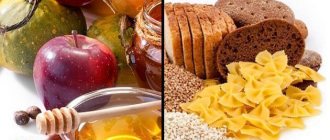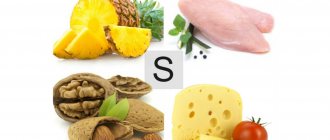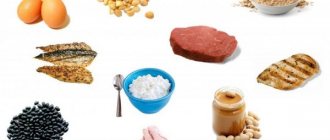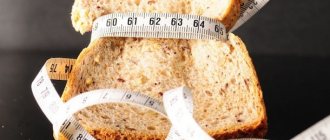Slow
Good or slow carbohydrates are foods with a low glycemic index. Characteristics of this energy group:
- presence of vitamins, fiber and minerals
- chemical structure that speeds up metabolism
- prolonged digestion
- slow release of calories
The good ones, also known as complex compounds, are found in whole grains, unprocessed rice, cereals, nuts, seeds, vegetables and fruits.
Fast
Bad or fast carbohydrates are a nutritional group with a high glycemic index and properties:
- digest very quickly
- cause fluctuations in blood sugar levels
- provoke a sharp release of insulin
- lead to the deposition of adipose tissue
Sources of fast or simple carbohydrates are foods that are pre-processed, lack fiber, and have low nutritional value.
Fast carbohydrates, list of products:
- pasta made from soft wheat varieties
- potatoes, white bread, pastries
- confectionery - cakes and desserts
- muesli, cereal, white rice, popcorn, sugar
- instant porridge and puree, honey
- yoghurts and curds with additives
- jam, chips, lemonades, sweet drinks, juices
A carbohydrate-balanced menu consists mainly of foods including:
- dark flour
- fruits and vegetables
In this case, the processes of lipogenesis - that is, the formation and deposition of fat in the body are under control.
Foods with easily digestible carbohydrates should be avoided:
- made from white flour
- semolina-type cereals
- with added sugar
Remember - simple carbohydrates are a calorie bomb devoid of nutrients.
Back to contents
Why fast simple carbohydrates contribute to weight gain
When eating foods containing fast carbohydrates, breakdown into the simplest compounds occurs within a short period of time, taking from 2 to 10 minutes. After this, easily digestible carbohydrates, decomposed into sugars, enter the bloodstream, increasing the concentration of glucose in the blood. When sugar levels increase due to the consumption of digestible carbohydrates, the pancreas produces insulin to get rid of excess glucose.

In the absence of physical activity, the body consumes the required amount of simple sugars, the rest is processed and stored in muscle and liver cells. If the body experiences elevated sugar levels, the body blocks the processing of stored fat reserves for consumption as energy. And since easily digestible carbohydrates are distinguished by the fact that they cause a feeling of hunger after a short period of time, it turns out to be a vicious circle. In it, the body constantly requires food, and consumed foods are processed into fat deposits.
This is not to say that fast carbohydrates are not beneficial; they provide the body with essential nutrients, vitamins and microelements. However, their amount should not exceed 30% of the total amount of carbohydrates consumed during the day. Nutritionists recommend minimizing the amount of these substances in the body and consuming these foods in the morning. Another option for their use is to restore calories after hard physical work or sports, while fruits will not only provide restoration of strength, but also contain fiber that is not absorbed by the human intestine.
When creating a menu, not everyone pays attention to the fact that potatoes represent fast carbohydrates in most of the forms used (mashed, fried, fried). The exception is the consumption of boiled potatoes with skins, which in this case are classified as complex carbohydrates. In addition, experts draw attention to the need to carefully count calories in cereals, the amount of which will depend on the purity of the product used and the method of its preparation (with milk or water).
Is it right to give up carbohydrate-containing foods?
Sometimes, people, in pursuit of good shape, decide to avoid eating any carbohydrates. But, this is a bad choice.
- Low-energy nutrition is of the ketogenic type. A lack of energy substances in the diet leads to the process of ketosis - fat burning, during which ketone substances enter the blood. These are toxins, in particular, depressing brain functions.
- In addition, the body increases the production of hormones - norepinephrine, adrenaline and glucagon. These compounds are useful in the short term, but on an ongoing basis lead to exhaustion of the body and endocrine disruption.
- Another unpleasant aspect of a low-carbohydrate diet is hypercholesterolemia with rapid vascular damage and the risk of conditions such as stroke or heart attack.
- Just 3-4 months of eating without plant fiber will cause gastrointestinal problems - vomiting, constipation or nausea. Additionally, a deficiency of vitamins B, C and A will form, the body will become acidic, the nervous system will become hyperactive, and the urinary system will react with gout.
- Separately, disorders of calcium phosphate, hemoglobin and glucose metabolism may develop. That is, a person will become acquainted with type 2 diabetes, osteoporosis or osteopenia.
Therefore, the right choice would be a healthy diet rich in slow carbohydrates.
Back to contents
Low Carb Diet
This diet is necessary for those who want to maintain normal functioning of the body and control their entire body. With such a diet, insulin remains at the same level, without jumps, which prevents fat deposition. You need to include foods high in protein and fat in your diet:
- lean meats
- eggs
- fish
- seafood (shrimp, mussels, etc.)
- seeds and nuts
- homemade milk
- dairy products (preferably not from the store, because industrially produced dairy products are always full of strange additives)
For 1 kg of body weight you should consume 1 g of protein. The diet should also include:
- rice
- cereals
- potatoes in small quantities
- corn (corn flakes and sticks are prohibited!)
- peas
- oatmeal and buckwheat
You need to eat every 2-3 hours. If the break is more than 4 hours, the level of insulin in the blood drops significantly. Portions should be small. It is better to bake, boil, or steam foods. Do not fry under any circumstances. Give preference to raw or steamed vegetables. Canned vegetables are the least beneficial. They always add sugar, preservatives, flavorings and other substances that are deposited in the gastrointestinal tract, clogging it. Minimize the amount of smoked foods you consume.
Physical activity is also important with this diet. It is recommended to train 3-4 times a week for 30-45 minutes. If the load is greater, the level of insulin in the blood will drop, which means you are violating the very basis of the diet. In just 30 days of such nutrition, the absorption of microelements and nutrient organic substances is normalized, they are no longer deposited as fat. Discomfort in the intestines and stomach also disappears.
When and how to consume carbohydrate-containing foods?
There are general rules for consuming energy products.
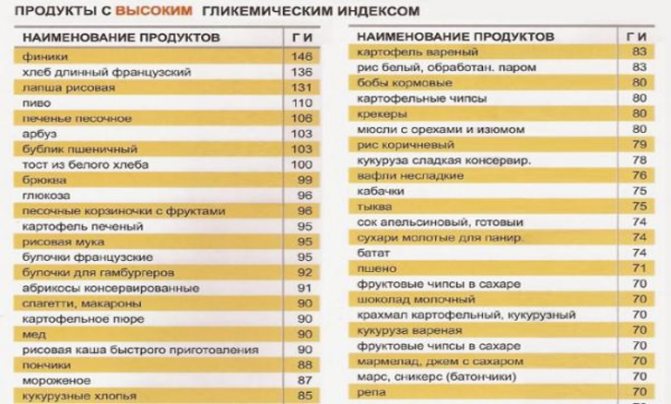
In the morning
You can use small amounts of fast carbohydrates, which will help your brain work intensively and will be a good way to start the day energetically. In the morning it is recommended:
- jam, marmalade or honey
- sweetened yoghurts
- cereal with dried fruits
And also, carbohydrates in porridges - semolina, millet, oatmeal with the addition of fruit.
Dinner
Must include complex carbohydrates:
- whole grain bread
- durum wheat pastes
- dark pasta and brown rice
In addition, fruits or vegetables in salads, side dishes and fresh.
Evening
Starting from 18-19 hours, it is recommended to eat only protein foods with the addition of lettuce or vegetables, except potatoes and legumes.
Depending on daily activity, when an energetic period is replaced by a measured period, it is necessary to reduce the amount of carbohydrates in the diet.
Back to contents
The right time for carbohydrates
It is necessary to consume such products wisely. Timing for fast and slow carbohydrates is especially important when losing weight. At night before bed you can’t do anything, neither complex nor simple. Some will take a long time to digest, but energy is not consumed, so everything will go into reserve. Plus, the residues pollute the body. Others will develop a stronger appetite.
Slow carbohydrates are suitable when energy expenditure is average and you need to maintain a feeling of fullness longer. They can be eaten for breakfast and lunch.
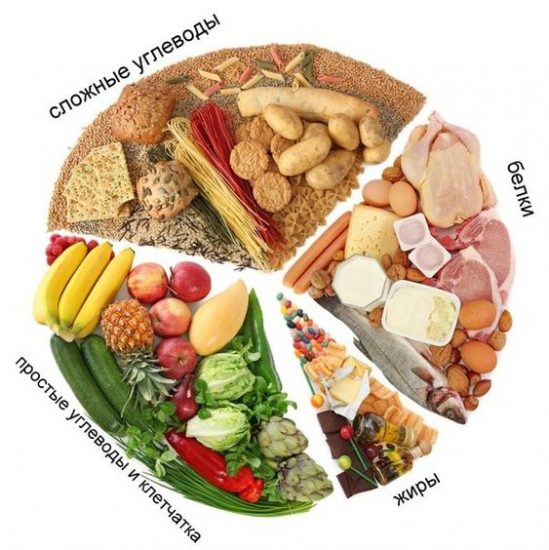
An hour before training, it is advisable to consume both slow and fast carbohydrates. The first ones will not have time to digest and will not provide enough energy. And simple ones will provide strength for exercise. But if the goal is to lose weight, then the amount of energy received should be less than the energy expended. Then, in search of strength, the body will be forced to spend its fat reserves.
In the evening, it is better to eat protein foods, which are spent on restoring strength and building muscle mass. But fruits are fast carbohydrates, not slow ones. Therefore, eating them for dinner is a big mistake.
Why is sugar dangerous?
If we can say about slow carbohydrates that these are natural fruits and whole grains, then among fast carbohydrates the most useless carbohydrate is sugar. The product has no nutritional value and is considered the drug of the century for a number of reasons.
Sugar:
- Stimulates the formation of beta-endorphins.
- Gives the illusion of stress relief, briefly improving mood.
- It produces biochemical dependence in people.
- It affects the brain in a way similar to opioid intoxication because it stimulates the same receptors that respond to morphine, heroin and codeine.
After eating sweets, people feel calm. They quickly get used to the cake = happiness scheme. As a result, they become dependent.
Excess sugar, as the most prominent representative of bad carbohydrates, leads to:
- hypertension, irritability, hyperactivity
- decreased mental functions, cancer pathology
- suppression of the immune system, accelerated aging
- slowing down recovery processes
Not everyone consciously chooses to abuse simple carbohydrates. Therefore, it is useful to know where sugar is hidden in hidden form.
Back to contents
Healthy foods with bad ingredients
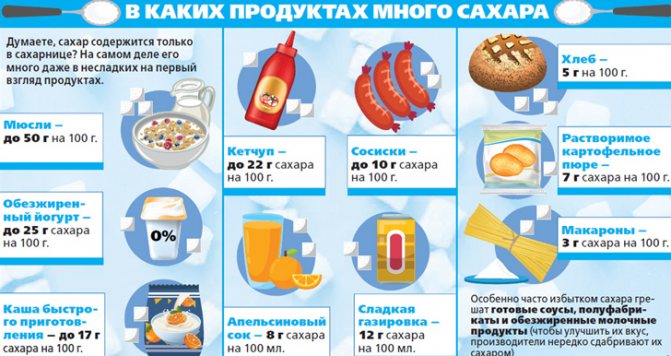
Diet cereals and candies are simply a trap for buyers, as they contain hefty doses of sugar. It's useful to know that this ingredient is also hidden in unsweetened foods:
- ketchup and salad sauces
- canned meat and fish
- peanut butter
- all types of bread
- yoghurts, muesli, cereal bars
- sausages and sausages
How can I find the information on the label? Read the section “Carbohydrates”, where the explanation “Including sugar” follows. On average, 150 grams of sugar-containing, although unsweetened, products contain up to 2 teaspoons of sugar. Healthy chocolate or cereal contains up to 3-5 spoons per 150 grams.
In conclusion, it is worth noting that nutritionists recommend paying attention not only to the amount of carbohydrates, but also to the presence of fats in foods, since the combination of sugar and fat has a particularly adverse effect on the health of the body.
Back to contents
